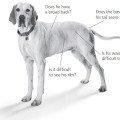 Over the past 10 years, the internet has become an asset to everyday life and is a source of easily available information at the click of a button. Search engines and websites such as WebMD receive trillions of hits each day, providing quick and easy information on many topics, especially human and veterinary medicine. In the past 10 years, it has become common for veterinarians and physicians to be presented with printed information by their clients who research signs and symptoms over the internet and attempt to diagnose themselves or their pets based on this information. In our profession, the act has been dubbed “consulting Dr. Google” and there are many reasons why we wish to educate our clients about being cautious when researching on the internet.
Over the past 10 years, the internet has become an asset to everyday life and is a source of easily available information at the click of a button. Search engines and websites such as WebMD receive trillions of hits each day, providing quick and easy information on many topics, especially human and veterinary medicine. In the past 10 years, it has become common for veterinarians and physicians to be presented with printed information by their clients who research signs and symptoms over the internet and attempt to diagnose themselves or their pets based on this information. In our profession, the act has been dubbed “consulting Dr. Google” and there are many reasons why we wish to educate our clients about being cautious when researching on the internet.
It is important to realize that ANYONE can publish information on the internet. It is difficult for us to know who these authors are, education or credentials they have and whether or not the information has been reviewed by others in the field to be proven to have validity and therefore be a reliable and accurate source. Many of the people that post information on websites are very passionate and well-meaning, presenting detailed and seemingly logical information. However, it is important to realize many opinions are merely anecdotal or unknowingly misinformed.
Interpreting information can be especially confusing when a formal diagnosis has not been made as collections of signs and symptoms could be inaccurately misinterpreted. This can cause one to worry very unnecessarily about a truly minor problem or lead one to delay necessary care with respect to a condition in dire need of immediate attention. Veterinarians undergo intense training and have the experience necessary to piecing together signs and symptoms in order to be able to logically diagnose a condition and recommend an evidence-based treatment plan.
Internet searches are most helpful when looking for supplemental information on a condition that has already been diagnosed by your veterinarian. Here are some tips for avoiding online “junk food”
Search websites recommended by your veterinarian such as:
o www.veterinarypartner.com
o www.healthypet.com
- Type “veterinary college” or “veterinary school” into the search field along with the topic you are searching (ie. “feline asthma veterinary college”)
- Learn to recognize anecdotal information and other “National Enquirer-type” stories like, “Aromatherapy cured my dog of heartworm disease!”
- Ensure that correct spelling and grammar are used
- Avoid websites offering products for sale
- If the problem is of a breed-specific nature, try to informing from a national breed website (i.e. search “miniature schnauzer breed associations”)When reading forums, try to involve yourself in only those that are:
- “vetted” (i.e. those that are routinely monitored and inspected by several informed moderators) such as AddisonDogs, Tripawds
- limited to specific diseases (i.e. kidney failure, diabetes)
- existence for several years
We hope this article has helped you to improve the quality of your search results and to become a more conscientious researcher no matter what topic you are interested in. We welcome and support taking an active approach in your pet’s care and encourage open and honest discussion regarding information found on the internet or anything at all!






